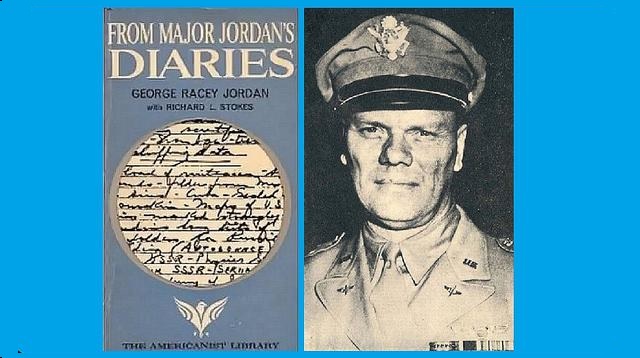WATCH: Major George R. Jordan’s Diaries on Communist Subversion of the United States During WWII

This is an astonishing document.
As far as I know, only two people were jailed and for a very, very long time for assisting the Soviets to get the nuclear bomb.
Yet listening to Major Jordan, it should have been a goodly part of Washington, D.C.
Having read part of the Whittaker Chambers book, Witness, this video makes an excellent companion to his document about the nature of communism in that era, and how penetrated the U.S., and clearly Canada was at the time.
WATCH: Major George R. Jordan’s Diaries on Communist Subversion of the United States During WWII
About Major George Racey Jordan
George Racey Jordan (January 4, 1898 – May 5, 1966) was an American military officer, businessman, lecturer, activist, and author. He first gained nationwide attention in December 1949 when he testified to the United States Congress about wartime Lend-Lease deliveries to the Soviet Union, in the process implicating Harry Hopkins and other high officials in the transfer of nuclear and other secrets to the USSR.
Jordan’s three ledgers were of importance to the FBI in mapping Soviet wartime activities in the United States. They are also often quoted by researchers investigating the loss of atomic secrets to the USSR. In particular, Richard Rhodes used Jordan’s book in his history of the H-bomb. Whatever Jordan’s later political activism, he gave a detailed and revealing personal account of how Soviet Lend-lease worked in practice during 1943–44. While the Hopkins notes are disputed in detail, Jordan’s account of Hopkins’s numerous direct interventions for the USSR match contemporary accounts.
In 1956, Jordan settled a libel suit against NBC for “a substantial amount” after the network falsely reported that Congressional investigators had “discredited Jordan’s charges.” Rather, Jordan’s testimony was dismissed out-of-hand by liberal voices at the time, and later discounted in part due to his association with right-wing causes, his unwelcome implication of high-ranking officials, and his own career of limited breadth and narrow distinction.
The New York Times, in reviewing Jordan’s first book, provided a snapshot of the author hereby: “What emerges in the way of self-portrait is an earnest, conscientious, deeply patriotic and limited man – a World War I “retread,” as he wryly calls himself – who has got mixed up in an argument whose end is not in sight.”
RELATED VIDEO: G. Edward Griffin: Meet Major George R. Jordan, State Department Whistleblower
RELATED VIDEO: Deep State PLOT to REMOVE TRUMP Happening NOW
EDITORS NOTE: This Vlad Tepes Blog column posted by Eeyore is republished with permission. ©All rights reserved.


Leave a Reply
Want to join the discussion?Feel free to contribute!